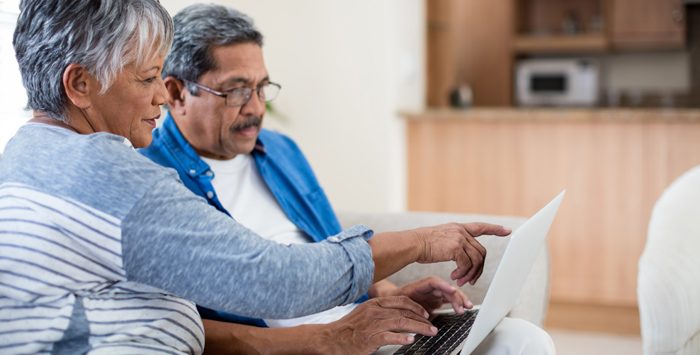As a Medicare beneficiary, where you live – meaning your state of residence – can have a significant impact on the care that you receive and how you pay for that care during your “golden years.” This page explains how Georgia’s regulations and policies are likely to affect your bottom line.
How does Georgia determine eligibility for Medicare Savings Programs?
Many Medicare beneficiaries who struggle to afford the cost of Medicare coverage are eligible for help through a Medicare Savings Program (MSP). In Georgia, this program pays for Medicare Part B premiums, Medicare Part A and B cost-sharing, and – in some cases – Part A premiums.
Asset limits: Georgia uses the federal asset limits for QMB, SLMB and QI – which are $9,090 if single and $13,630 if married.
Who’s eligible for Medicaid for the aged, blind and disabled (ABD) in Georgia?
Medicare covers a great number of services – including hospitalization, physician services, and prescription drugs – but Medicare can leave enrollees with large out-of-pocket expenses (i.e. co-pays, deductibles and coinsurance). Furthermore, Original Medicare doesn’t cover important services like vision and dental care. Some beneficiaries – those with low incomes and assets – can receive coverage for Part A and B cost sharing and services Medicare doesn’t cover if they’re enrolled in Medicaid for the aged, blind and disabled (ABD).
In Georgia, ABD Medicaid may cover dental care in emergencies on a “case by case basis.” For routine dental care, this resource lists dental clinics for beneficiaries with low incomes in Georgia.
ABD Medicaid also covers one pair of eyeglasses each year. A second pair of glasses may be covered due to significant changes in vision needs.
ABD Medicaid doesn’t automatically cover Long Term Services and Supports (LTSS) in most states. Those benefits require a different application and have different income limits than ABD Medicaid..
Income eligibility: The income limit is $914 a month if single and $1,371 a month if married.
Asset limits: The asset limit is $2,000 if single and $3,000 if married.
Medicaid ‘spend-down’ for Medicaid for the aged, blind and disabled in Georgia
Applicants who are over-income for ABD Medicaid but have assets below the resource limit can enroll in the Medicaid spend-down program in Georgia. This program allows enrollees to subtract incurred medical expenses from their income so that it is below the eligibility limit.
When an applicant is approved for the spend-down, Medicaid calculates the portion of their monthly income above the income limit (known as “excess income”). Enrollees activate their spend-down coverage by showing they have medical bills equal to this excess income.
In Georgia, the Medicaid spend-down program does not cover long-term care. Applicants with incomes too high to qualify for LTSS can become eligible for them using a Miller Trust (described below).
Income eligibility: The income limit is $317 a month if single and $375 a month if married.
Asset limits: The asset limit is $2,000 if single and $4,000 for a married couple.
Federal assistance with prescription drug costs in Georgia
Medicare beneficiaries who also have Medicaid, an MSP, or Supplemental Security Income (SSI) will receive Extra Help. This program lowers Medicare Part D prescription drug costs. When beneficiaries apply for this program themselves, the income limit is $1,843 a month for singles and $2,485 a month for couples. The asset limit is $16,660 for individuals and $33,240 for spouses.
How does Georgia regulate long-term services and supports (LTSS)?
Medicare beneficiaries increasingly rely on long-term care, and the portion of seniors needing these services will keep rising as the population ages. However, long-term care is mostly not covered by Medicare. While Medicaid fills the gap in Medicare coverage for long-term care, its complex eligibility rules can make qualifying for benefits difficult. What’s more – eligibility rules vary significantly from state to state.
Applicants who are seeking Medicaid long-term care benefits have to undergo a level of care assessment.
Georgia uses a “special income limit” for Medicaid nursing home benefits and HCBS. This limit is 300% of the Supplemental Security Income (SSI) payment amount.
Medicaid nursing home coverage
Most seniors used to receive long-term care in nursing homes. Today, many Americans receive those services in their homes. But medical conditions or living situations can make nursing home care a better choice for some.
Income limits: The income limit is $2,742 a month if single and $5,482 a month if married (and both spouses are applying). When only one spouse needs Medicaid, the income limit for single applicants is used – and many states only count applying spouse’s income toward the eligibility limit.
Even though the income limit is $2,742 a month (if single), nursing home enrollees are not allowed to keep all of their income up to this limit. Instead, they pay all but a small portion of it to their nursing home, although they can keep a small personal needs allowance (of $70 each month) and money to pay for health insurance premiums (such as Medicare Part B and Medigap).
Assets limits: The asset limit is $2,000 if single and $3,000 if married (and both spouses are applying). If only one spouse needs Medicaid, the other spouse is allowed to keep up to $148,620.
Certain assets are never counted, including many household effects, family heirlooms, certain prepaid burial arrangements, and one car. Nursing home enrollees cannot have more than $688,000 in home equity.
Home and Community Based Services (HCBS) waivers
Medicaid programs in each state cover varying levels of community-based long-term care, which is provided at home, or in an adult day care center or assisted living facility. This Medicaid benefit is known as a Home and Community Based Services (HCBS) waiver because recipients don’t have to enter a nursing home.
Income limits: The income limit is $2,742 a month if single and $5,482 a month if married (and both spouses are applying). When only one spouse needs HCBS and the other spouse doesn’t have Medicaid, the income limit for single applicants is used – and often only the applying spouse’s income is counted.
Asset limits: The asset limit is $2,000 if single and $3,000 if married (and both spouses are applying). If only one spouse has Medicaid, the other spouse can keep up to $148,620. Applicants for HCBS must have less than $688,000 in home equity.
Or call
866-445-0071 (TTY 771) to speak to a licensed insurance agent.
(Mon-Fri 8am-9pm, Sat 10am-7pm ET)
Qualifying for Medicaid LTSS with income above the eligibility limit in Georgia
The Medicaid spend-down in Georgia does not cover LTSS, which means applicants with incomes above the eligibility limit for Medicaid ABD can’t qualify for those benefits. But individuals with incomes higher than the limit for nursing home benefits or HCBS can qualify for those services by depositing income into a Qualified Income Trust, which is also called a “Miller Trust.”
Spousal impoverishment protections in Georgia
Eligibility rules for Medicaid LTSS programs differ from other Medicaid benefits when only one spouse is applying. When this occurs, only the applying spouse’s income is counted. With other Medicaid benefits, the income of both spouses is counted – regardless of who is applying.
Spousal impoverishment rules allow the spouses of Medicaid LTSS recipients to keep a Minimum Monthly Maintenance Needs Allowance (MMMNA) from their Medicaid spouse’s monthly income. These rules apply when one spouse receives Medicaid LTSS benefits, and the other spouse doesn’t have Medicaid.
Nursing home enrollees would pay nearly all of this income toward their care if they were unable to transfer a portion of it to their spouse.
In Georgia in 2022, these “community spouses” are allowed to keep:
Permitted home value in Georgia
Federal law requires states to restrict eligibility for Medicaid nursing home and HCBS to applicants with a home equity interest below a certain dollar amount. States set these home equity levels based on a federal minimum of $688,000 and maximum of $1,033,000 in 2023.
Georgia uses the lowest limit on home equity allowed under the law – and requires applicants for nursing home care or HCBS to have no more than $688,000 in home equity.
Penalties for transferring assets in Georgia
Because long-term care is expensive, individuals can have an incentive to give away or transfer assets to others so they can become eligible for Medicaid LTSS benefits. To curb this incentive, federal law requires states to have a penalty period for Medicaid nursing home applicants who give away or transfer assets for less than their value. States have the option to also use a penalty period for HCBS. Medicaid will not pay for an enrollee’s LTSS during this penalty period.
Georgia has chosen to have an asset transfer penalty for both nursing home care and HCBS. This penalty is based on a 5-year long lookback period during which asset transfers and gifts are prohibited. An individual’s penalty period is calculated by dividing the amount of money given away or transferred during the lookback period by the average cost of private pay nursing home care (this amount is $9,034.00 in 2023).
Estate recovery in Georgia
States are required to attempt to recover Medicaid’s payments for long-term care related costs beginning at the age of 55. States can choose to also recover all other Medicaid benefits. This is called estate recovery.
Georgia has chosen to only pursue estate recovery for enrollees who received long-term care benefits starting at age 55. But the state does also recover from some enrollees younger than this who were “permanently institutionalized.”
The state does not pursue estate recovery from estates valued at $25,000 or less.
Where can Medicare beneficiaries get help in Georgia?
Georgia’s State Health Insurance Assistance Program
Free volunteer Medicare counseling is available by contacting Georgia’s State Health Insurance Assistance Program (SHIP) at 1-866-552-4464 Option 4.
SHIPs can help beneficiaries enroll in Medicare, compare and change Medicare Advantage and Part D plans, and answer questions about state Medigap protections. They may also be able to offer referrals to local agencies for services like home care and long-term care. This website has more information about GeorgiaCares.
Elder Law Attorneys
Elder law attorneys can help individuals plan for Medicaid long-term care benefits. You can use the National Academy of Elder Law Attorneys (NAELA)’s search feature to find an elder attorney locally.
How do I apply for Medicaid in Georgia?
The Georgia Department of Human Services (DHS) administers the Medicaid program in Georgia. You can apply for Medicaid ABD or an MSP using this website (and clicking the “Apply for Benefits” button on the lower right). Medicaid’s phone number is (877) 423-4746 in case you have questions about your application.


